Presentation
The current trend in the field of didactics of translation is to develop an assessment at university level that goes beyond its certifying function and promotes its formative component. The communicative, orienting and dialogic function of formative assessment is developed mainly through feedback, which is generated, above all, by lecturers. Feedback can be conceived as a specific type of pedagogical aid that aims to facilitate the construction of knowledge and the self-regulation of learning. The positive influence of formative assessment systems on the improvement of students' academic performance is currently unquestionable. Particularly, there is consensus in the literature on the benefits of feedback in teaching-learning processes, to the extent that Hattie (1992: 9) states: "the most powerful single modification that enhances achievement is feedback".
Based on this approach, a review of the general research on formative assessment and feedback in translation training reveals a paradoxical situation: despite its unquestionable pedagogical value and the numerous studies that have addressed its specific impact in different fields of knowledge, there are not many studies on teaching practices and students' perceptions of the feedback they receive in the translation classroom.
The RetroTrad project, funded by the Spanish Ministry of Science and Innovation and the State Research Agency (PID2020-113236GB-I00/MICIN/AEI/10.13039/501100011033) aims to contribute to filling this knowledge gap by studying translation classroom feedback practices framed in their situational context.
